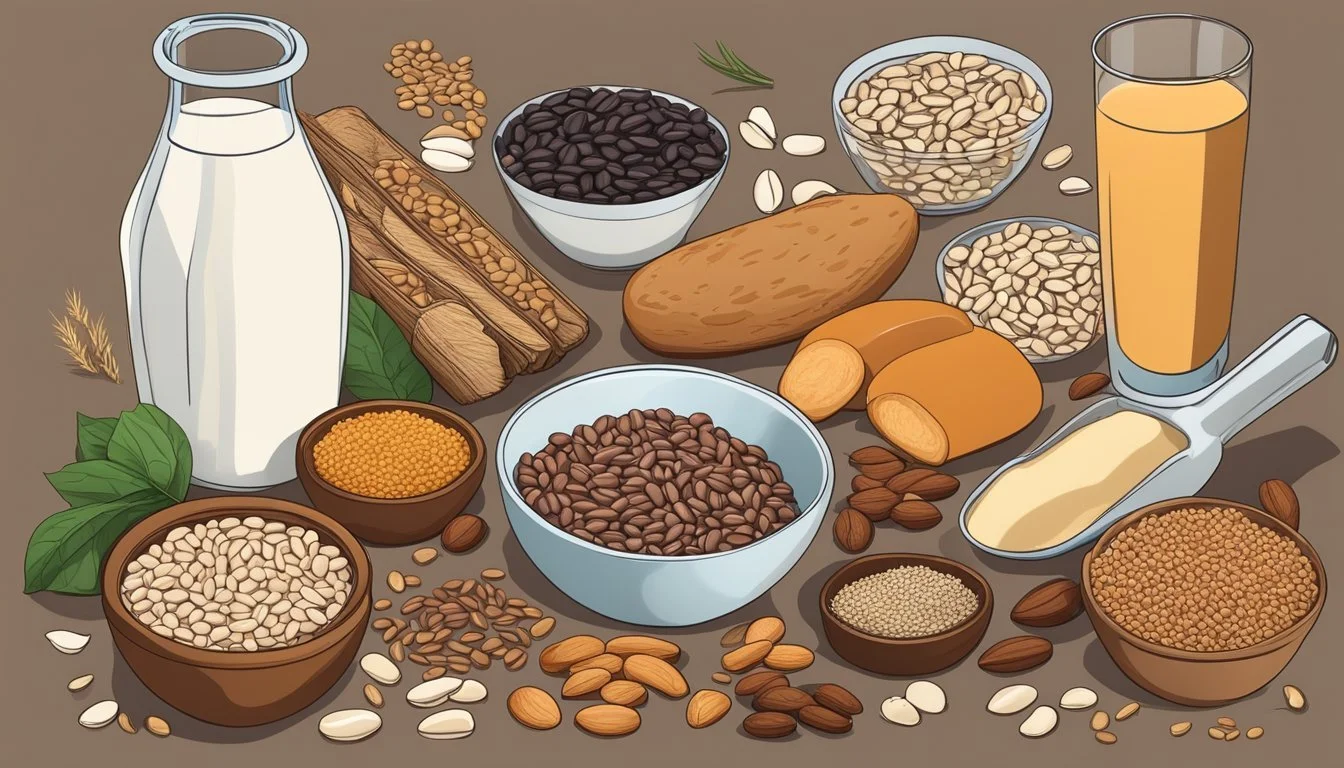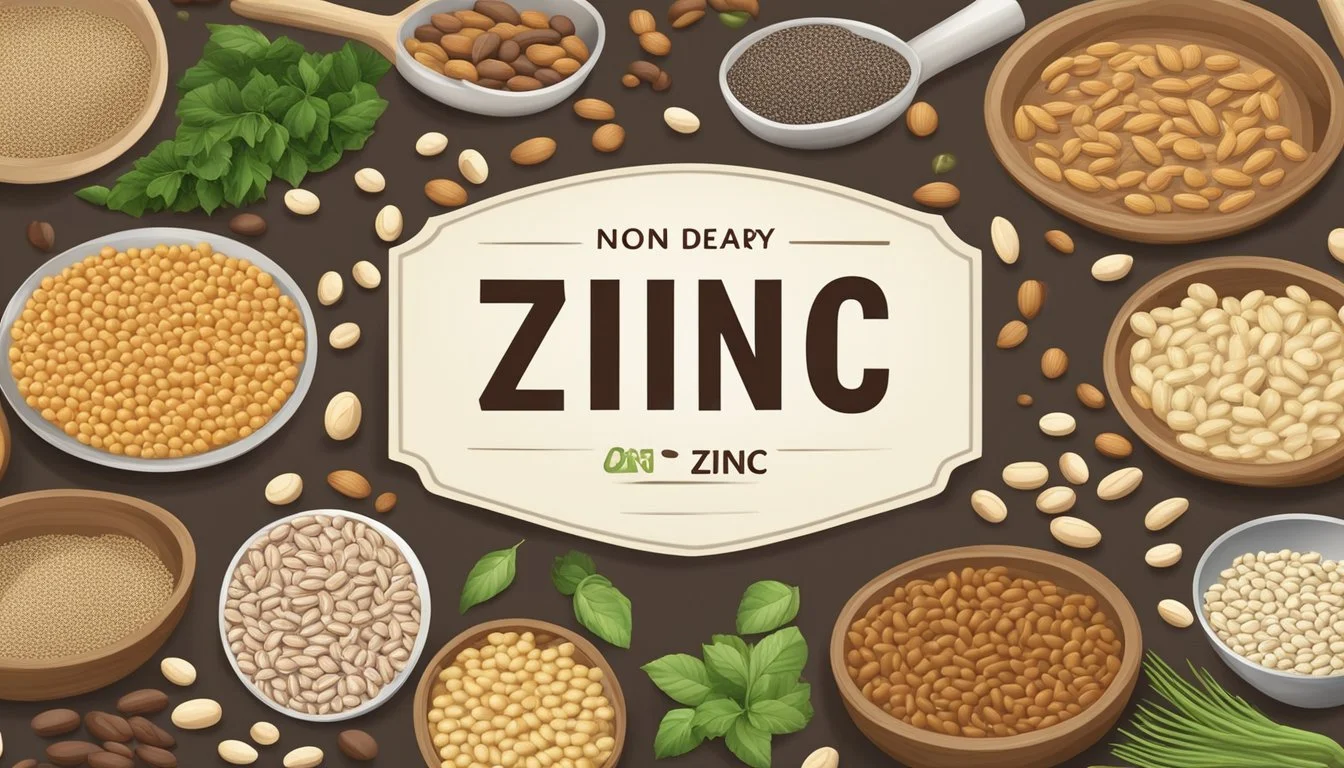How Can I Get Enough Zinc If I'm Lactose Intolerant
Alternative Sources Explained
Lactose intolerance is a common digestive issue where the body lacks enough of the enzyme lactase to break down lactose, the sugar found in milk and dairy products. This deficiency can lead to uncomfortable symptoms such as bloating, gas, diarrhea, and abdominal cramps when dairy is consumed. For individuals with lactose intolerance, it is essential to find alternative nutritional sources to maintain a balanced diet, especially for nutrients commonly found in dairy products, like zinc.
Zinc is a vital mineral that supports numerous functions in the body, including immune system performance, wound healing, DNA synthesis, and cell division. While dairy is a well-known source of zinc, those with lactose intolerance need to seek other zinc-rich foods to ensure they are meeting their daily nutritional requirements. Fortunately, zinc is abundant in a variety of other foods such as meat, fish, legumes, seeds, nuts, and whole grains, allowing for a diverse and inclusive diet that can accommodate lactose intolerance while still providing this essential nutrient.
It is critical for lactose-intolerant individuals to carefully plan their diets to avoid deficiency. Learning about and integrating alternative zinc sources, as well as understanding portion sizes and the bioavailability of zinc from different foods, empowers those with lactose intolerance to confidently manage their health without relying on dairy. This deliberate dietary approach ensures a sufficient intake of zinc, promoting overall well-being and preventing the symptoms associated with lactose intolerance.
Understanding Lactose Intolerance
Lactose intolerance is a condition where the body cannot adequately digest lactose, often leading to uncomfortable digestive symptoms. Proper diagnosis and understanding the different types of intolerance can help manage the condition effectively.
Defining Lactose Intolerance
Lactose intolerance occurs when the small intestine does not produce enough lactase enzyme, which is essential for breaking down lactose, a sugar found in milk and dairy products. When lactose is not properly digested, it moves into the colon rather than being processed and absorbed. Undigested lactose then interacts with intestinal bacteria, resulting in symptoms associated with the condition.
Symptoms and Diagnosis
Common lactose intolerance symptoms include:
Gas
Bloating
Nausea
Cramps
To diagnose lactose intolerance, a doctor may suggest a breath test or other tests to measure how the body reacts to lactose. Symptoms typically emerge shortly after consuming dairy, ranging from mild to severe.
Types of Lactose Intolerance
There are several types of lactose intolerance:
Primary lactose intolerance: This is the most common type, developing over time as lactase production decreases, usually after childhood.
Secondary lactose intolerance: Caused by an illness or injury that affects the small intestine.
Congenital or developmental lactose intolerance: A rare condition where infants are born with little to no production of lactase.
Risk Factors and Prevalence
Certain populations have a higher incidence of lactose intolerance. For instance, it is more prevalent in people of Asian or African descent. Risk factors include age, as lactase production typically decreases with age, and certain genetic factors. While it can affect individuals of any age, it is less common in infants and young children.
Zinc Essentials
Zinc plays a pivotal role in maintaining a healthy immune system and is a crucial element in various biological processes. It is particularly important for individuals with lactose intolerance to understand alternative zinc sources, as dairy products are a common zinc provider.
Importance of Zinc in the Body
Zinc is a trace mineral necessary for the proper functioning of numerous enzymes that aid in metabolism, digestion, and nerve function. It is vital for the immune system, helping to keep it robust and responsive to pathogens. This mineral is also essential for the synthesis of protein and DNA within cells, underscoring its role in growth and development.
Zinc's involvement extends to the maintenance of skin integrity and structure, as well as the regulation of gene expression. The body does not store excess zinc, so consistent intake through diet is necessary to meet the daily dietary needs. Despite its presence in various foods, no single food item is expected to provide all the necessary zinc, and a balanced diet is crucial.
Dietary sources of zinc include:
Seafood: Oysters, crab, and lobster
Meat: Beef, pork, and lamb
Poultry: Chicken and turkey
Legumes: Chickpeas, lentils, and beans
Nuts and seeds: Pumpkin seeds, cashews, and almonds
Zinc and Lactose Intolerance Correlation
For individuals with lactose intolerance, obtaining sufficient zinc can be challenging since dairy products are often rich in this nutrient. Lactose intolerance precludes them from consuming traditional sources of zinc such as milk and cheese without experiencing discomfort.
Fortunately, zinc is found in a variety of non-dairy foods as well. Here, understanding the correlation between zinc and lactose intolerance means recognizing the need to focus on alternative dietary options to meet zinc requirements. It's important for those with lactose intolerance to include zinc-rich foods in their diets or consider supplements if necessary, while being mindful of the balance with other nutrients such as copper and magnesium.
Incorporating a diverse array of foods, particularly those rich in zinc that are not dairy-based, ensures that the immune system and cellular functions are supported without relying on lactose-containing products. For individuals considering zinc supplements, a healthcare provider should be consulted to prevent any potential interference with the absorption of other essential minerals.
Dietary Sources of Zinc for Lactose Intolerants
Lactose intolerant individuals can ensure adequate zinc intake by choosing from a variety of non-dairy foods and lactose-free dairy alternatives rich in this essential mineral.
Zinc-Rich Non-Dairy Foods
Certain foods are naturally high in zinc and are appropriate for those with lactose intolerance. Here's a list of these foods:
Legumes: Chickpeas, lentils, and beans not only offer a good amount of zinc but also provide fiber and protein.
Nuts and Seeds: Almonds, cashews, pine nuts, and flaxseeds are beneficial for zinc intake.
Whole Grains: Opt for fortified cereals and oatmeal, which can be sources of zinc as well as other vitamins and minerals.
Soy Products: Tofu and soy milk are not only good dairy alternatives but are also rich in zinc.
Fish: Shellfish like oysters and crab provide high levels of zinc, and fish such as sardines and salmon are also good sources.
Lactose-Free Dairy and Dairy Alternatives
For those who prefer dairy-type products, lactose-free options are available:
Lactose-Free Milk Products: These products have the lactase enzyme added to break down lactose, making it digestible and retaining its zinc content.
Dairy Alternatives: Almond, soy, oat, and coconut milk are alternative beverages. While they are not naturally high in zinc, many are fortified with zinc and other nutrients.
Supplements and Nutrition Planning
Individuals with lactose intolerance need to ensure they are obtaining sufficient zinc in their diet, given the restriction on dairy products. Zinc supplements can serve as an effective measure to provide the necessary dietary zinc, while maintaining a balanced diet rich in zinc-containing foods is fundamental to overall nutritional well-being.
Zinc Supplements
Zinc supplements can be an integral part of the dietary plan for those who are lactose intolerant, provided they are taken within the recommended dosage to avoid side effects such as nausea or stomach pain. Adults should not exceed 40 milligrams daily without consulting a healthcare provider.
Types of Supplements: Various forms of zinc supplements are available, including zinc gluconate, zinc sulfate, and zinc acetate.
Dosage: Adherence to recommended dosage is crucial.
Prescription: A healthcare provider can prescribe an appropriate dosage and form based on individual health needs.
Creating a Balanced Diet
For lactose-intolerant individuals, it's important to incorporate a variety of zinc-rich foods into their diets to meet nutritional requirements without relying on dairy products.
Protein Sources: Options include meats, such as beef and pork, and plant-based alternatives like legumes and nuts, which are excellent protein sources and also contain zinc.
Vitamin D and Calcium: Since dairy is often a source of vitamin D and calcium, lactose-intolerant individuals should consider fortified foods or supplements to ensure they meet their needs for these nutrients.
Whole Grains, Vegetables, and Fruits: Whole grains, along with certain vegetables and fruits, provide additional nutrients that support overall health.
It may be beneficial to work with a dietitian to create a personalized eating plan that ensures adequate intake of zinc and other essential nutrients.
Managing Lactose Intolerance in Daily Life
Living with lactose intolerance requires careful attention to diet to avoid lactose intolerance symptoms while ensuring nutritional needs are met. It involves understanding where lactose can hide in foods and making lifestyle adjustments to manage the condition effectively.
Identifying Hidden Lactose
People with lactose intolerance need to read labels diligently, as lactose can be found in unexpected foods such as baked goods, soups, and snack foods. Lactose may not always be listed directly; it can be present in ingredients like whey, curds, milk by-products, dry milk solids, and nonfat dry milk powder. Additionally, some prescription medications and over-the-counter pills use lactose as a filler. Thus, it is crucial for individuals to become skilled at spotting these hidden sources to avoid discomfort.
Lifestyle Adjustments and Remedies
Adjusting one's lifestyle is paramount for managing lactose intolerance. Opting for lactose-free alternatives to dairy products like milk, cream cheese, and sour cream can significantly reduce symptoms. Including probiotics in the diet may help some people by improving the digestion of lactose. Home remedies, while not a cure, can provide relief. These may include over-the-counter lactase enzyme supplements before consuming dairy. Importantly, while making dietary changes, one should not neglect overall nutrition, especially calcium and vitamin D intake, which are commonly obtained from dairy sources.
When to Consult a Healthcare Professional
Navigating lactose intolerance requires keen awareness of nutritional needs and symptom management. If complications arise or zinc intake is in question, seeking medical advice is crucial for maintaining optimal health.
Monitoring Symptoms and Treatment Response
Symptoms such as nausea, vomiting, and pain may indicate that zinc supplementation or dietary adjustments are not having the desired effect or are causing adverse reactions. It is essential to monitor any changes following treatment or dietary changes for signs of too much zinc, which can include dizziness and headaches. If symptoms persist or worsen, it is advisable to consult a doctor or healthcare provider.
Persistent symptoms post dietary adjustment: Consultation needed
Adverse reactions to supplements: Immediate medical attention required
Seeking Professional Dietary Advice
Meeting nutritional needs while being lactose intolerant often requires tailored dietary guidance. Registered dietitians can provide strategies to incorporate zinc-rich, lactose-free foods into one's diet. They can assess individual requirements and recommend appropriate zinc supplementation if necessary. When self-determined dietary changes do not alleviate symptoms or if there is uncertainty about zinc sources, professional advice is warranted.
Uncertainty about dietary sources of zinc: Seek dietitian's counsel
Ineffective self-managed diet: Obtain personalized dietary plan
Conclusion
Individuals with lactose intolerance need to manage their diet carefully to ensure adequate zinc intake. They can achieve their nutrition requirements by incorporating zinc-rich lactose-free foods into their diet. Foods like fortified cereals, nuts like almonds and cashews, and seeds such as pumpkin seeds are excellent sources. Meats, poultry, and seafood also provide high levels of zinc.
They must be particularly mindful of their dietary choices, as the avoidance of dairy could inadvertently lead to a deficiency in essential nutrients. A balanced diet, complemented by appropriate lactose-free zinc supplements if necessary, can help maintain health and wellness.
Consulting with a healthcare provider or dietitian is advisable for those with lactose intolerance. They can provide personalized dietary management plans that not only cater to the need for zinc but also for overall nutritional needs, helping to navigate the condition without compromising on health.






